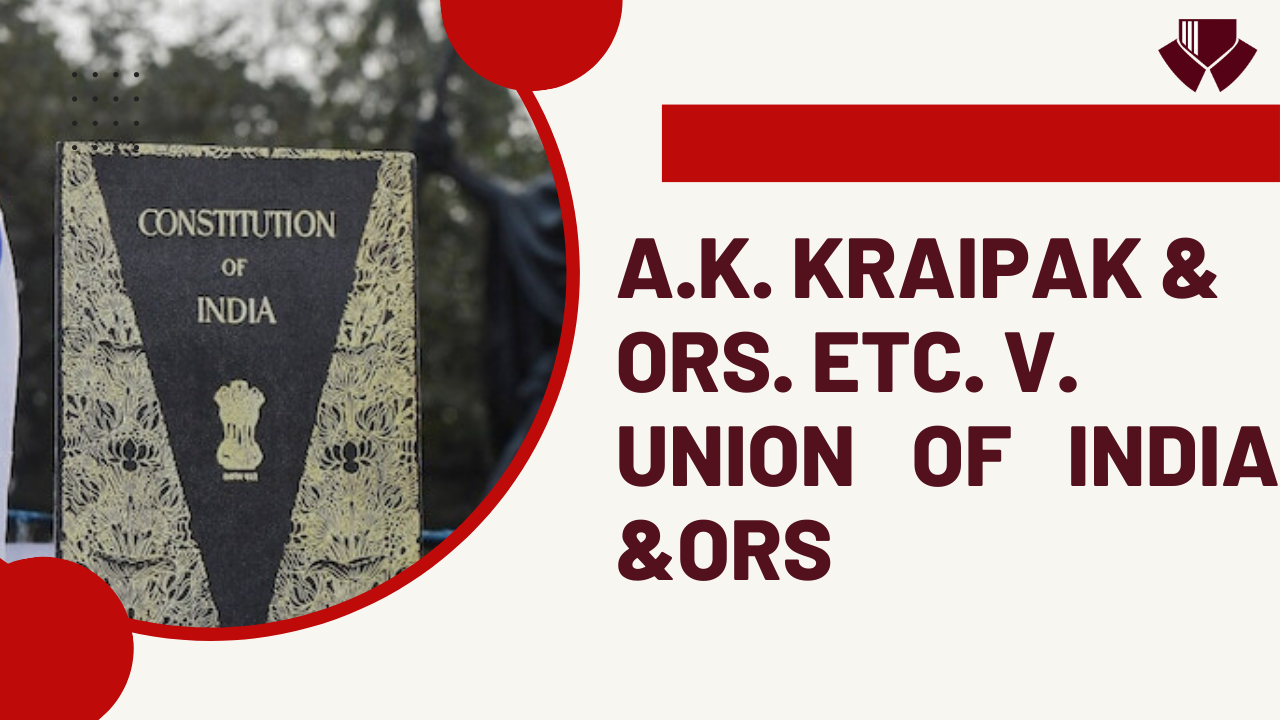This case analysis is done by Sanjeev, a law student.
Citation: AIR 1970 SC A
Bench: Hon’ble Mr. Justice M. Hidayatullah, C.J., J.M. Shelat, K.S. Hegde, A.N. Grover and Vashishtha Bhargava, JJ.
Date of Judgement: 29/04/1969
Facts
The case of “A. K. Kraipak & Ors. Etc. vs. Union of India & Ors.” is a significant landmark in Indian administrative and constitutional law. It was heard and decided by the Supreme Court of India on April 29, 1969. The background of the case revolves around a challenge to the appointment and promotion of certain officers in the Indian Administrative Service (IAS) and the Indian Police Service (IPS).
The petitioners, A. K. Kraipak and others were officers within these services, and they raised fundamental concerns regarding the appointments and promotions of some of their colleagues. They contended that these appointments were arbitrary, unlawful, and had been influenced by extraneous factors, particularly political considerations. The appointments, they argued, were not made based on merit, as established by the governing rules and procedures.
The case garnered significant attention because it went beyond the specific appointments in question and delved into a broader issue concerning the independence and professionalism of the civil services in India. The petitioners argued that the recruitment and promotion of officers in these services should strictly adhere to merit-based criteria, free from any political or arbitrary influence.
The Supreme Court’s ruling in this case had far-reaching implications. It reinforced the principles of fairness, impartiality, and adherence to established procedures in the selection and promotion of civil servants, particularly in the IAS and IPS. The judgment emphasized that appointments and promotions must be free from any political or extraneous considerations, ensuring the credibility and integrity of India’s civil services. This case played a pivotal role in upholding the merit-based nature of these appointments, setting a significant precedent for preserving the autonomy and professionalism of the Indian bureaucracy.
Issues Involved
The key issues that the Supreme Court addressed, in this case, were as follows:
- Natural Justice and Fairness: The main question revolved around whether A. K. Kraipak’s appointment to a significant public office adhered to the principles of fairness and justice, which are fundamental aspects of natural justice.
- Right to a Fair Hearing: The case emphasized the right to be heard as a fundamental principle of natural justice. The Court considered whether a person affected by an administrative decision should be given an opportunity to present their case and have their concerns addressed before an adverse decision is made against them.
- Avoiding Bias: The Court examined the rule against bias, specifically focusing on whether the mere possibility of bias, especially in situations involving government appointments, was sufficient to disqualify the decision-maker.
Contentions of Parties
Contentions of the Petitioners (A. K. Kraipak & Ors.):
The primary contention of the petitioners was that the appointments and promotions of some of their colleagues within the IAS and IPS were arbitrary and unlawful. They argued that these selections were not made on the basis of merit, which is the established principle for such appointments but rather influenced by extraneous considerations, including political affiliations.
The petitioners contended that the appointments and promotions in question were tainted by political considerations and lobbying, which undermined the integrity and fairness of the process. They emphasized that appointments and promotions within these services should be based solely on merit and adherence to established procedures.
The petitioners raised these concerns not just for the specific appointments in question but to set a precedent for preserving the merit-based nature of appointments and promotions within the civil services. They argued that the autonomy and professionalism of these services must be maintained by ensuring that the recruitment and promotion processes are free from any political or arbitrary influence.
Contentions of the Respondents (Union of India & Ors.):
The respondents, representing the Union of India, defended the appointments and promotions in question by asserting that the established procedures had been followed. They argued that these selections were made by the existing rules and guidelines.
The respondents contended that there was no concrete evidence to substantiate the claims of arbitrary or politically influenced appointments. They maintained that the decisions were based on the evaluation of merit and the assessment of the candidate’s qualifications.
The respondents emphasized the importance of maintaining administrative autonomy in the selection and promotion of civil servants. They argued that while political considerations may play a role in administrative decisions, these should not undermine the overall merit-based process.
Judgement
In its landmark decision on 29 April 1969, the Supreme Court of India rendered the following key findings:
- Natural Justice and Procedural Fairness: The Court held that natural justice is a fundamental principle that must be upheld in all government decisions that affect an individual’s rights or interests. The Court stressed that the right to be heard is an essential component of natural justice.
- Right to Be Heard: The Court affirmed that when an individual’s rights or interests are at stake, they have a right to be heard before any adverse decision is made against them. In the context of appointments to crucial public offices, the affected person must have the opportunity to present their case and challenge the decision-maker’s impartiality.
- Rule Against Bias: The Court ruled that in cases where there is a reasonable suspicion of bias, even if it is merely a possibility, the affected person should be given a chance to present their case and challenge the decision-maker’s impartiality. The Court held that bias, whether actual or apprehended, could compromise the fairness of the decision-making process.
Conclusion
In the case of A. K. Kraipak & Ors. vs. Union of India & Ors., the Supreme Court held that A. K. Kraipak’s appointment as the Chairman of the UPSC was invalid due to the reasonable suspicion of bias. The Court’s decision established a significant precedent in Indian administrative law, emphasizing the importance of natural justice, the right to be heard, and the rule against bias in government decisions affecting individuals’ rights and interests. This judgment has had a lasting impact on administrative law in India, ensuring that government actions follow due process and maintain impartiality.


